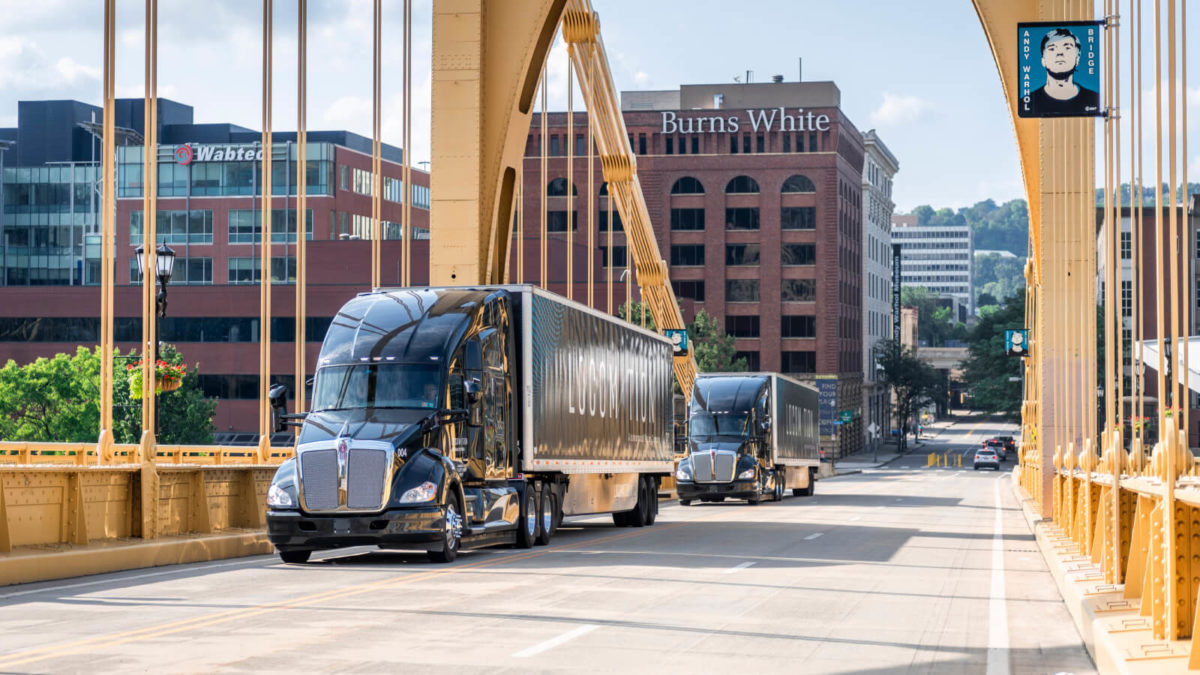The key to making the world’s supply chain greener, at least in the short term, might just be — autonomous trucks?
At the end of November, Lawrenceville-based autonomous trucking company Locomation released an environmental report authored by the firm Boundless Impact Research and Analytics. Labeled by Locomation as the first of its kind, the report provides specific numbers on emissions, operating costs and the overall greenhouse gas (GHG) footprint of autonomous trucking.
Unlike other autonomous vehicle companies developing products for the trucking industry, Locomation employs a unique two-truck convoy system — which the company refers to as its Human-Guided Autonomy system — in which one truck is driven by a human and the second follows along autonomously. The idea is that two drivers can be available per convoy, and that while one is driving the front truck the other can rest in the autonomous one and alternate as needed. With this structure, the wind shear is also reduced for the second truck by following the first, which reduces overall fuel usage.
Among the most significant findings of the environmental impact report were the reduction of GHG footprint by 22%, operating costs by 19% and fuel consumption by 22%, compared to traditional Class 8 trucks — numbers that a Locomation press release said account for millions in saved costs. These statistics are some of the earliest confirmations to come out of specific effects a switch to autonomous technology could have on the transportation industry, though many have previously speculated that the effects would be beneficial to the environment.
Data for the report was collected and tracked by Boundless separately from the Pittsburgh company, Locomation cofounder and CEO Çetin Meriçli told Technical.ly.
“We would much rather prefer third-party, independent assessments because ultimately, credibility and integrity are key to this process,” he said.
Read the reportBeyond helping ensure that Locomation’s commercial product is addressing environmental, social and governance (ESG) concerns prior to its launch, this data also has significant implications for any industry reliant on trucking.

Çetin Meriçli. (Photo via LinkedIn)
Scope 3 emissions, which come from “outsourced transportation,” are “a significant part of the overall greenhouse gas emissions in the world,” Meriçli said, adding that road transportation plays an outsized role in their spread. “So what our technology will be bringing to the market will have a profound effect on how the shippers can reduce their carbon footprints.” Knowing that Locomation’s technology is successful in significantly reducing those emissions will make it an enticing choice for the increasing number of corporations taking ESG goals more seriously today.
Still, the trucking industry remains far behind that of smaller vehicles on the timeline of electrification, something Meriçli called a “science problem” more than anything else. Thus, while this report details numbers for fossil fuel-reliant trucking, the future of electric trucks and a fully green supply chain is still far enough off that these numbers remain relevant to the industry.
Locomation, for its part, is well on the way to a commercial launch, with plans to put its trucks on the road at scale by late 2022 through partnerships with Wilson Logistics and PGT Trucking (the latter of which is slated for a 2023 launch). But Meriçli emphasized that getting data like this out as soon as possible will be key for the company’s public trust and customer acquisition process in anticipation of the launch — something we’ve noted is true for other autonomous vehicle companies.
“We wanted to quantify [these environmental benefits] and we wanted to flag that,” he said. “We wanted to have that independent verification so that we can go and present it to our customers, future customers and their future customers so that they can start rallying the entire industry around this concept, because it always takes time to change the way things are working today.”
Sophie Burkholder is a 2021-2022 corps member for Report for America, an initiative of The Groundtruth Project that pairs young journalists with local newsrooms. This position is supported by the Heinz Endowments.Before you go...
Please consider supporting Technical.ly to keep our independent journalism strong. Unlike most business-focused media outlets, we don’t have a paywall. Instead, we count on your personal and organizational support.
Join our growing Slack community
Join 5,000 tech professionals and entrepreneurs in our community Slack today!

The person charged in the UnitedHealthcare CEO shooting had a ton of tech connections

From rejection to innovation: How I built a tool to beat AI hiring algorithms at their own game

Where are the country’s most vibrant tech and startup communities?


